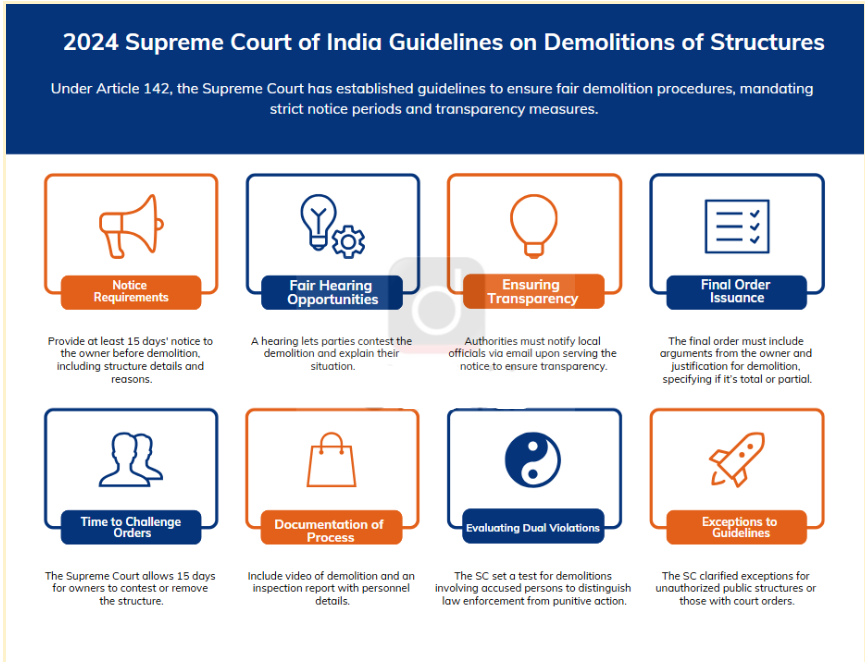Indian Polity
SC Upholds Due Process in Prayagraj Demolition Case
- 02 Apr 2025
- 7 min read
For Prelims: Supreme Court of India, Article 21, Geneva Convention, Alternative Dispute Resolution
For Mains: Implementation of due process of law in demolition drives, Judicial review and protection of fundamental rights in India
Why in News?
The Supreme Court of India condemned the 2021 bulldozing of homes by the Prayagraj Development Authority as “inhumane and illegal,” ordering Rs 10 lakh compensation for each affected individual.
- The judgment reinforces the right to shelter against arbitrary state actions and curbing arbitrary demolitions.
What is the SC’s Judgment on Demolitions in Prayagraj?
- Right to Shelter: The SC reiterated that the right to shelter is intrinsic to the right to life and personal liberty under Article 21.
- Arbitrary demolition without due process violates both procedural fairness and human dignity.
- Violation of Due Process: The SC noted that authorities failed to provide homeowners with a reasonable opportunity to respond.
- It observed that notices were merely affixed instead of being served in person or via registered post, as required under the Uttar Pradesh Urban Planning and Development (UPUPD) Act, 1973.
- Precedents and Legal Framework: The SC cited its 2024 ruling (In Re Directions In The Matter Of Demolition Of Structures), which laid down guidelines against "bulldozer justice," mandating 15 days' prior notice, clear mention of violations, and a fair chance for occupants to challenge demolition orders.
- The SC noted that even before this 2024 judgment, the UPUPD Act, 1973 required genuine attempts at personal service of notices.
- The court reminded the authorities that the rule of law must be upheld, and arbitrary actions cannot be justified.
Judicial Pronouncements on Property Demolitions
- Maneka Gandhi vs Union Of India, 1978 : SC ruled that laws must be just, fair, and reasonable, reinforcing "due process of law," making arbitrary demolitions unconstitutional.
- Olga Tellis v. Bombay Municipal Corporation, 1985: SC affirmed that the right to shelter is part of Article 21, making demolitions without due process a violation of fundamental rights.
- K.T. Plantation (P) Ltd. V. State of Karnataka Case, 2011: SC Held that deprivation of property under Article 300-A must follow fair and just legal procedures.
What is Bulldozer Justice?Click here to Read: Bulldozer Justice |
How Do Arbitrary Demolitions Undermine Rule of Law and Human Rights?
- Erosion of Rule of Law: Demolitions executed as punishment, without conviction or trial, undermine the judiciary's role and elevate the executive’s actions above legal scrutiny.
- Rise of Instant Justice: The use of bulldozers for arbitrary demolitions as symbolic retribution bypasses courts and reinforces the narrative of “instant justice,” which is legally unsound and ethically troubling.
- Collective Punishment: Families, including women, children, and elderly members unrelated to the alleged offence, are rendered homeless, amounting to collective punishment, violating international humanitarian law under the Geneva Conventions.
- Geneva Convention (Article 87) prohibits collective punishment, arbitrary demolitions breach this norm.
- Massive Humanitarian Impact: Housing and Land Rights Network reported over 1.5 lakh homes demolished and 7.38 lakh people displaced in 2022-23 alone highlighting the scale of disruption.
- Psychological and Economic Fallout: Sudden evictions destroy livelihoods, disrupt education, and cause mental trauma especially for urban poor and marginalized communities.
What Steps Should Be Taken to Prevent Arbitrary Demolitions?
- Strict Enforcement of SC Guidelines: Codify 2024 SC Guidelines into municipal and state laws to ensure uniform implementation across jurisdictions.
- Introduce national legislation to regulate eviction and demolition processes in line with international standards such as the United Nations Basic Principles and Guidelines on Development-Based Evictions and Displacement.
- Strengthening Institutional Frameworks: Set up dedicated tribunals to adjudicate disputes over encroachments and demolitions with power to stay arbitrary actions.
- Create fast-track systems at the district level for affected individuals to contest demolition orders.
- Promote Alternative Dispute Resolution (ADR) mechanisms like mediation and arbitration to settle disputes between occupants and authorities amicably before resorting to demolition.
- Transparency and Accountability: Maintain an online portal listing all planned demolitions, served notices, final orders, and recorded videos to promote transparency.
- Mandate that each demolition is supported by an inspection report, demolition report, and video evidence.
- Resettlement Measures: Adopt a ‘rehabilitate first, demolish later’ policy in all urban and rural areas.
- Ensure those affected by legal demolitions are provided with alternative housing under schemes like Pradhan Mantri Awas Yojana, along with livelihood and mental health support.
|
Drishti Mains Question: How does the concept of "arbitrary demolitions" undermine the rule of law and human rights? |
UPSC Civil Services Examination, Previous Year Question (PYQ)
Mains
Q. Discuss the various social problems which originated out of the speedy process of urbanisation in India. (2013)
Q. The basis of providing urban amenities in rural areas (PURA) is rooted in establishing connectivity. Comment (2013)





